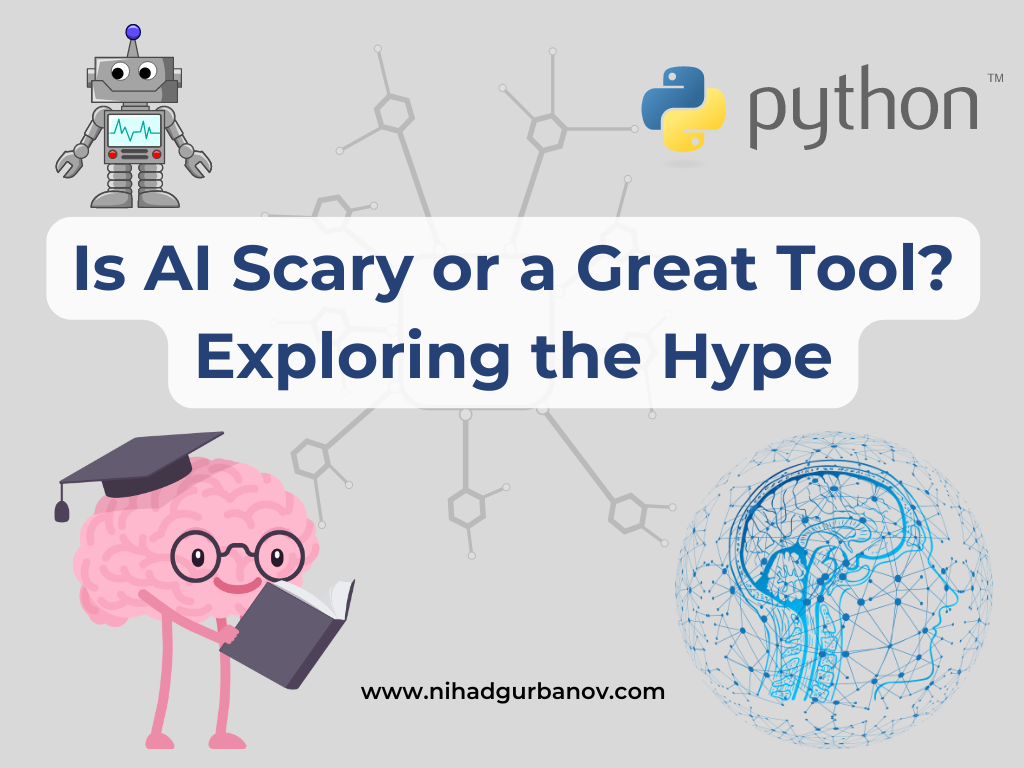Is AI Scary or a Great Tool? Exploring the Hype and Its Relation to Cognition
In today’s rapidly evolving digital landscape, artificial intelligence (AI) often elicits mixed reactions. Some people see it as a powerful tool for enhancing productivity and innovation, while others express fear and skepticism about its implications. This blog post delves into the dichotomy surrounding AI, its connection to metacognition, and the mysteries of human cognition, while also examining the current and future potential benefits of AI for economics and human welfare.
The Duality of AI: Tool or Threat?
AI has emerged as a transformative force across various industries, streamlining processes and enabling businesses to scale. By automating mundane tasks, AI allows individuals to focus on more creative and strategic activities, potentially leading to significant advancements in productivity. For instance, a McKinsey Global Institute report suggests that AI could contribute an additional $13 trillion to the global economy by 2030, significantly impacting productivity and economic growth .
However, this technology also raises concerns about job displacement, ethical implications, and the loss of human control. Many fear that AI will replace jobs, particularly in sectors where routine tasks are prevalent. For example, a report by the World Economic Forum predicts that while AI may displace 85 million jobs by 2025, it could also create 97 million new roles, emphasizing the need for workforce reskilling . This anxiety is exacerbated by a lack of understanding of AI’s capabilities and limitations. Additionally, ethical concerns surrounding bias, privacy, and potential misuse further fuel apprehension. As we integrate AI into our lives, addressing these fears is crucial to ensuring responsible and beneficial use.
Current and Future Benefits of AI
- Economic Growth: AI is set to revolutionize industries ranging from manufacturing to healthcare. For instance, AI applications in predictive maintenance can save businesses significant costs by preventing equipment failures. According to a report from PwC, AI could increase global GDP by 14% by 2030, primarily through productivity gains and increased consumer demand .
- Healthcare Improvements: AI’s potential to enhance healthcare is substantial. Algorithms can analyze vast datasets to identify patterns and predict health outcomes, leading to earlier diagnoses and more personalized treatments. For example, AI-driven tools have shown promise in identifying conditions like cancer at earlier stages, ultimately saving lives and reducing healthcare costs .
- Environmental Sustainability: AI can play a crucial role in tackling climate change. By optimizing energy consumption and improving resource management, AI can help reduce carbon emissions. According to a report by the International Energy Agency (IEA), AI could help reduce global energy consumption by 10-15% by 2030 through enhanced efficiency .
- Enhancing Human Welfare: Beyond economics, AI has the potential to improve human welfare significantly. For instance, AI applications in education can provide personalized learning experiences, helping students learn at their own pace. AI-driven platforms can analyze student data to tailor educational content, potentially reducing dropout rates and improving overall educational outcomes .
Metacognition and AI: A Curious Connection
Metacognition, the awareness and understanding of one’s own thought processes, presents an intriguing framework to analyze AI. While AI lacks genuine self-awareness, it can be programmed to monitor and analyze its performance, enabling it to adjust strategies and improve outcomes. This aspect of AI mirrors metacognitive strategies, allowing systems to learn from feedback and correct errors.
Moreover, enhancing AI’s transparency and explainability can improve user trust and foster better understanding. By making AI’s decision-making processes more accessible, we can bridge the gap between human cognition and artificial systems.
The Enigma of Human Cognition
Despite advancements in neuroscience and psychology, human cognition remains largely unexplored. While researchers continue to uncover how the brain operates, many facets, such as consciousness and emotional intelligence, remain elusive. This complexity underscores the distinction between human intelligence and AI, as the intricacies of human thought are still being debated.
As we consider the implications of AI, it’s essential to recognize that it operates on algorithms and data patterns rather than authentic understanding. This limitation highlights the uniqueness of human cognition and the ongoing quest to unravel its mysteries.
Conclusion
The discourse surrounding AI is multifaceted, oscillating between its potential as a transformative tool and the fear it generates. While AI can undoubtedly enhance productivity and drive innovation, it also raises ethical and societal questions that need to be addressed. By understanding the relationship between AI and metacognition, we can leverage AI’s capabilities while remaining aware of its limitations.
In this era of digital transformation, it’s crucial to engage in open dialogues about AI’s role in our lives, acknowledging both its advantages and the complexities of human cognition. As we continue to explore the interplay between AI and authentic thought, we must strive to create a future where technology enhances, rather than replaces, the unique qualities of human intelligence.
References
- McKinsey Global Institute. (2018). “Notes from the AI frontier: Modeling the impact of AI on the world economy.”
- World Economic Forum. (2020). “The Future of Jobs Report.”
- PwC. (2017). “How will AI affect the economy?”
- Esteva, A., Kuprel, B., Wang, S., et al. (2017). “Dermatologist-level classification of skin cancer with deep neural networks.” Nature.
- International Energy Agency (IEA). (2019). “The Future of Cooling.”
- Luckin, R. (2016). Artificial Intelligence in Education: Promises and Implications for Teaching and Learning.

